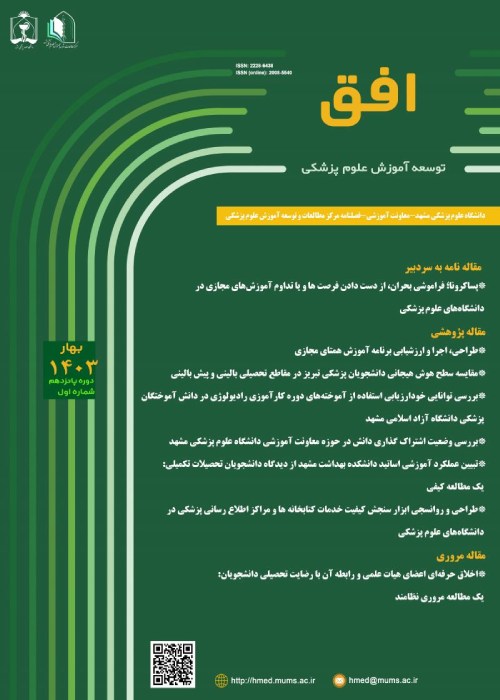Analyzing the lived experiences of medical students from virtual classes during the Corona era: a phenomenological study
With the spread of the new coronavirus disease, various aspects of human life have been affected. Students of medical sciences, who will have to serve as medical staff of the health system in the near future, have an urgent need to receive appropriate quality training. Social distancing has caused the way of teaching these students to be changed in a virtual way. The purpose of this study is to analyze the lived experience of students of the faculty of medical sciences from virtual classes during the Corona era.
This study was conducted in a qualitative and descriptive phenomenology type with the purpose of targeted sampling, with the participation of 23 medical students of Islamic Azad University, Sanandaj branch. The data collection tool was semi-structured interviews that were analyzed by thematic analysis and Van Menen's phenomenological method.
The research findings included 21 sub-themes; The first theme of problems of virtual classes has 4 sub-themes (infrastructural problems of university technology, low familiarity of professors with virtual classes, non-educational problems of students and educational problems of students). The second main theme has 5 sub-themes (laziness of students, lack of academic motivation of students, lack of proper communication between students and professors, hardware and software weakness of virtual classes and inconsistency of education curriculum elements). The third main theme of the strength of virtual classes has 3 sub-themes (access to teaching and learning resources, temporal and spatial flexibility of the educational system, increasing the student's self-education and self-direction) and the fourth main theme is the general perception of virtual classes, which includes 4 sub-themes (loss of knowledge and information of students, the vulnerability of practical courses, supplementing virtual education with face-to-face education and inappropriate access to content. The fifth main theme of the solutions for improving virtual classes includes 5 sub-themes (increasing the power of planning and scheduling, improving the interaction of students and professors, education and cultural development, and improving infrastructure Technology has been education.
Virtual education has not yet been able to provide medical students with the appropriate quality of education and prepare them for their future careers.
- حق عضویت دریافتی صرف حمایت از نشریات عضو و نگهداری، تکمیل و توسعه مگیران میشود.
- پرداخت حق اشتراک و دانلود مقالات اجازه بازنشر آن در سایر رسانههای چاپی و دیجیتال را به کاربر نمیدهد.



